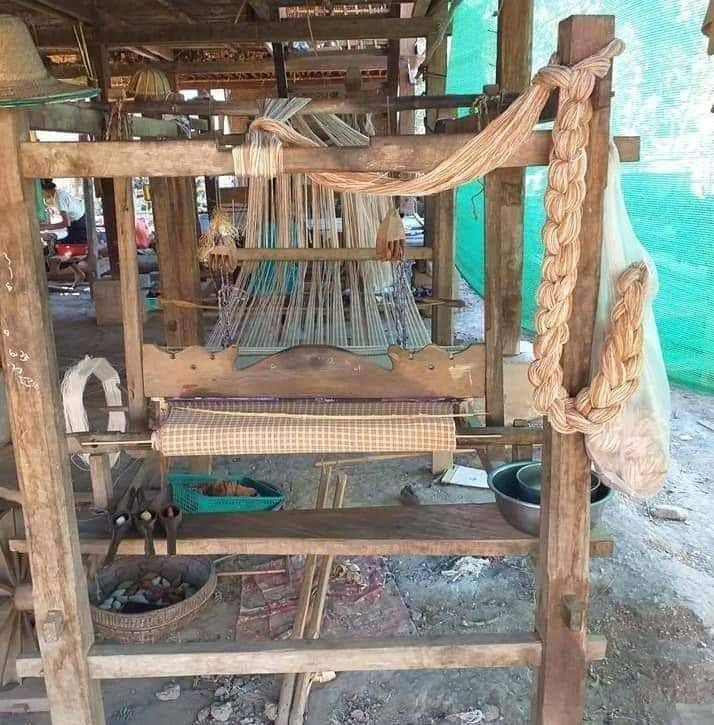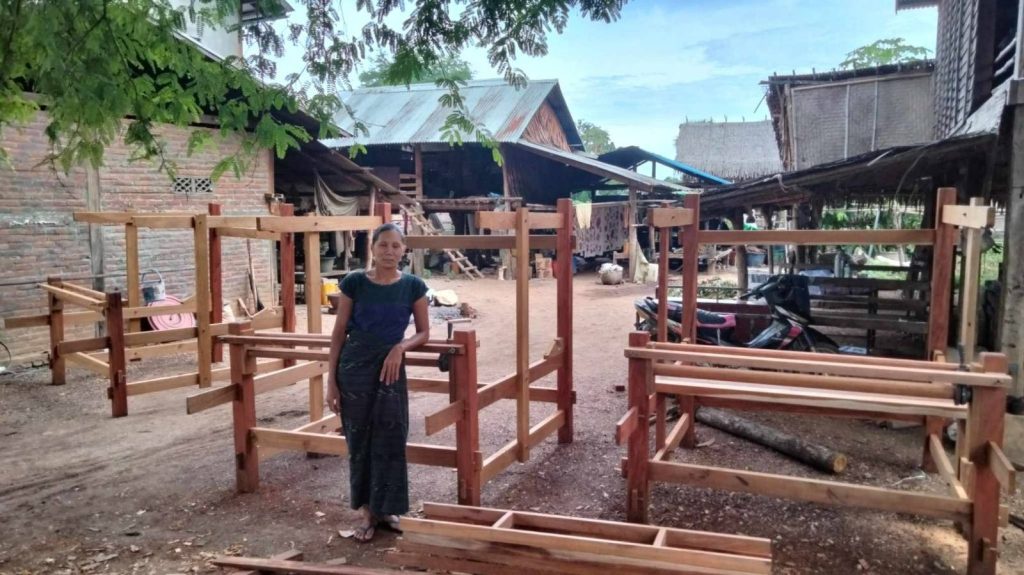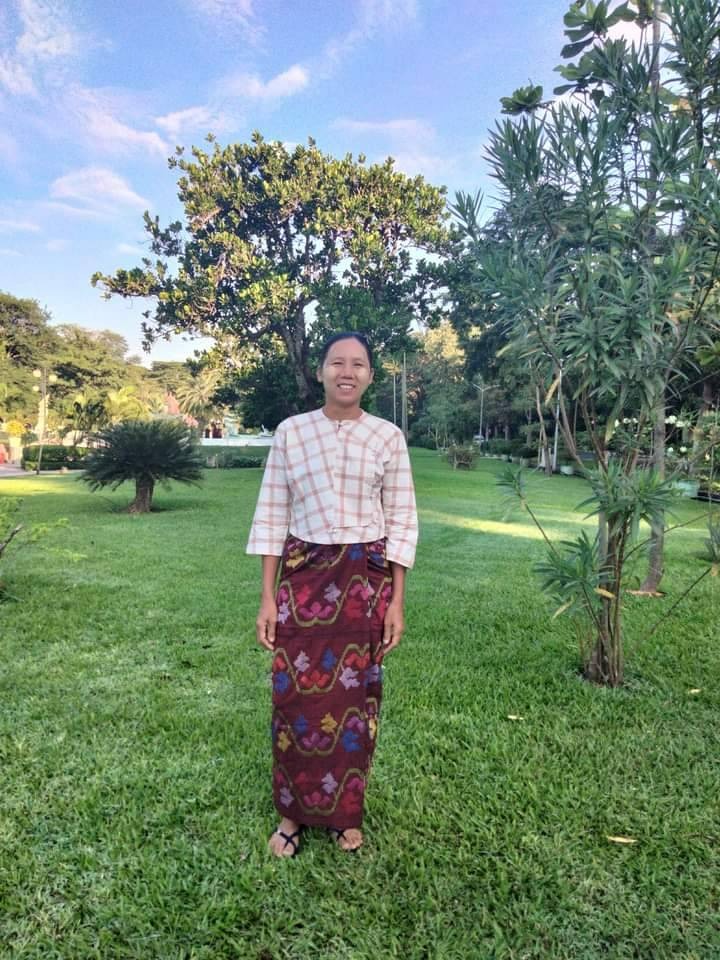Kay Khine
In the northern part of the Magway Region, specifically in Minhla Township, the women of Kai Nge Lay village are skilled in traditional weaving. However, they have never anticipated earning income from their looms. They weave longyi (sarongs), bath towels, hand towels, which are necessary items for the family.
But since there is a way to earn money from this, the sound of weaving is loud in Kai Nge Lay village and nearby villages.
Ma Khar, a 43-year-old woman from Kai Nge Lay village is leading the women in the village to generate additional income to support the families.
Ma Khar established a silk weaving mill where she taught weaving skills to the local women. She created the weaving mill under the name of ‘Ma Khar and Sisters,’ to help the local women to start their weaving mill in order to run their businesses and have income of their own.
In Ma Khar’s hometown, agriculture is the main source of income while they only weave when they have free time. They never thought to earn money from weaving Ma Khar learned weaving when she was an adolescent. However, rather than making a living out of it, she limited her weaving activities to creating clothes solely for her family members.
Yet, in the year 2017, Ma Khar and her sisters went to listen to a lecture held in a neighboring village. The lecturer said that if there is a loom, women can earn the money. They were very impressed with the lecturer’s speech.
Intrigued by the idea and realizing the potential of weavers in her village, Ma Khar went to see the lecturer in the evening. There, she posed her questions and received the encouragement she needed to transform the art of weaving into a sustainable livelihood.
Ma Kar and her two friends started the weaving project. Since they had experience weaving for their family members only, and did not understand the market interest. Since they do not know the likes of the people, the size is small and the color is not natural because of using the dye from the market, the people are dissatisfied with their products.
However, Ma Khar never felt discouraged. She approaches others who are professionals in the area of weaving and she also seeks advice from some groups and organizations that are experts in natural dye where she can enhance her weaving skills with a good understanding of the interest of the market.
Traditional weaving looms from Ma Khar’s village are generally small and thus she could not make bigger weaving fabrics. Therefore, she purchased a bigger weaving mill from Pakokku to meet the market demands.
Although Ma Khar and her friends are familiar with weaving when they have to weave large looms, they require systematic and professional weaving. They invited a weaving expert from Yasagyo and five women including Ma Khar methodically learned how to weave with a large loom. Out of five trainees, three were successfully skilled to the pro level. Those three continued to share what they had learned with other women from nearby villages.
After systematically learning the art of weaving, they started exploring and promoting their woven fabrics to get into the market. The local people are farmers and they farm beans, sesame, and corn in the region therefore their households have enough food but they are not rich. Women normally do the farming and they weave only when they have free time so Mar Khar and her friends put more affords on mobilizing the women to do weaving as a source of income.
They encountered numerous challenges, since there was no proper market for weaving fabrics and also to meet the demands of the market.
“I only used to weave for my family, so I had no idea how to make the clothing appealing to the consumer. I’m doing it because I want to, but since there isn’t much investment, it’s quite difficult, “said Ma Khar.
Hence, she researches online clothes and dye groups to improve her sales as well as listen to customers’ feedback.
“In the beginning, I had very little confidence. I don’t even dare ask how my product was after sending it to the customer. I was scared to hear that it was not up to their satisfaction”
Just as she began to comprehend the market dynamics, and her sales were becoming more organized with the support of the weaving community, the COVID-19 pandemic happened.
“I already have weavers and I was having regular orders from the customers. Then everything collapsed when Covid started”
When many businesses had to be suspended due to COVID-19, her group of weavers had to discuss whether to stop altogether or continue weaving regularly and sell when possible. Other women working with her decided to continue weaving since they had enough food for their livelihood. Fortunately, after the first wave, when businesses resumed, they were able to sell all of their weaving products.
Despite the motivation to continue after the first wave of COVID-19, they had to give up due to subsequent differing waves of the pandemic and later the attempted coup that happened on the 1st of February 2021. With the economy in crisis due to COVID-19 and political turmoil, distributors ceased their work, and Ma Khar had to discontinue her weaving project.
During that period, despite weaving cloths regularly that remained unsold, Ma Khar continued to pay salary so that the weavers would not be depressed. They were so much relief when the business could resume after eight months of the attempted military coup.
“We faced challenges for about nine or ten months, but we persevered through teamwork and survived the impacts of COVID-19 and the coup. That’s why we are called Ma Khar and Sisters.” Ma Khar proudly said.
In 2019, Ma Khar’s weaving enterprise, which commenced with seven women, has now expanded to involve over forty women weaving natural handwoven fabrics. Their group comprises women from Kai Nge Lay village and neighboring villages, with most of them in their forties. Moreover, there has been a growing interest from younger individuals who are now joining and learning the craft.
“We provide women an opportunity if they are interested in weaving, and that’s how the number has grown. Approximately forty people continued to weave out of sixty women who were trained.” Ma Khar stated, “After school, the advice is, ‘Come and learn to weave, it can either be a source of income for you, or you can learn it as a valuable skill.’ Parents from neighboring villages also started sending their children for the same purpose.”
Ma Khar and Sisters have established regular customers who buy their handwoven fabrics, and some customers place specific orders for customized linen designs. The weavers receive compensation for their work based on the exceeded quantity of fabric they produce each day.
“I Pay 2,000 kyats per towel. Some skilled individuals can produce five or six pieces of towels a day, and they earn more. Even if a weaver made only three pieces in a day, she then can earn 6,000 kyats,” said Ma Khar.
Currently, nearly every village has small-scale weavers collaborating with Ma Khar weaving project, and some women from other villages also come to learn weaving from her.
“This year, each pair from other villages has come to study weaving at my house. I have three weaving looms at home and whoever wants to learn, I welcome them.” Ma Khar explained.
In addition to weaving, Ma Khar also farms natural plants and personally handles the dyeing process.
When Ma Khar started weaving, only a few people were interested in buying clothes from Ma Khar because of using the dye from the market. Buyers appreciate the natural color of the fabrics, so she also had to learn more about natural dyeing methods as to meet with costumers demands.
“Since my weaving project is not that big, I cannot afford to buy expensive dye. So, I use local leaves for dyeing, and I also cultivate plants to use for natural coloring,” said Ma Khar.
Currently, Ma Khar and her sisters specialize in making towels, blankets, and shawls. They also receive orders from fabric entrepreneurs who specify the desired patterns. Ma Khar mentioned that she has a better understanding of the patterns preferred by the market.
"People who understand handicrafts often request specific patterns they desire. If I can accommodate their requests, I do so; otherwise, I decline. Through this process, I've gained insights into what the market prefers. I learned gradually by actively engaging in the craft," said Ma Khar.Previously, she taught weaving skills to local women and motivated them to promote their products in the market.
Most of the women working with her are in their 40s and 50s, but she notes that educated young women are also showing their interest in pursuing this career. This leads her to believe that the weaving business in her region will continue to improve.
She also expressed her goal of preserving traditional weaving in the region and enabling women to earn income while staying at home with their families. She has come this far because of the people who believe in her and support her.
Ma Khar mentioned that people in the region have recognized weaving as a means of earning income, and they are dedicated to their work while expressing gratitude to the buyers.
Ma Khar expressed her happiness by stating, “I do this business for the greater benefit of my region. I am glad that we could earn some income collectively. I am so thankful to those who buy the products from the upper Myanmar. It brings me joy to have gained the trust of buyers.”
In the future, she aims to enhance the design of fabrics to cater to the preferences of buyers and empower local women. Ma Khar urged the youth to join hands in advancing the weaving project in their region, emphasizing her dedication to helping more women generate their self-income which can make them stand proudly as women who do not need to depend on their husbands or partners.
- ကိုးရီးယားမှာ အောင်မြင်နေတဲ့ ကရင်မိန်းကလေးငယ် အဆိုတော် ဖိုးမူကြီး (သို့မဟုတ်) မာသာထူးဝါး - 25/03/2025
- တစ်ပတ်အတွင်းအမျိုးသမီးဖြစ်ရပ်များ - 22/03/2025
- Media Statement: United Voices from Women’s Rights and LGBTQIA+ Rights Organizations on Dialogues for Gender, Women, Peace, and Security in Myanmar - 21/03/2025





